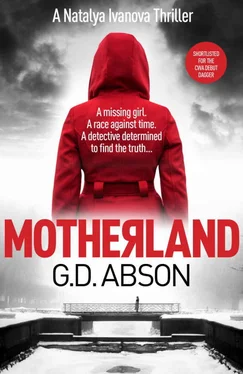‘Colonel,’ Sergeant Rogov began, ‘I called all the hospitals and mortuaries in a twenty-kilometre radius of the city. There was no one matching Zena Dahl’s description.’
Vasiliev scraped his thumbnail against the United Russia badge on his shirt as if there was some dirt on it that couldn’t come off it. ‘Sergeant, Major Dostoynov asked specifically about drowning.’
Rogov frowned, evidently unhappy to contradict the new major. ‘A body in the canals or the Neva floats unless weighted with stones. And then, with the White Nights and the tourists, it’s impossible to avoid being seen.’
Natalya hadn’t had lunch and also felt a pressing need for tea, something to take away the dryness in her mouth. ‘Colonel, I do have some important information. Zena Dahl’s neighbour, Lyudmila Kuznetsova, lives in the same block and reported seeing a man calling at her apartment the morning she went missing. She described him as a bureaucrat with grey hair and wearing a suit.’
Vasiliev turned the corners of his mouth down in a shrug. ‘Could be anyone. What else do you have?’
‘Expert Criminalist Primakov has been assisting me. He checked Zena’s apartment for fingerprints.’
‘And?’ asked Vasiliev.
She thought of Leo Primakov’s mimes and hoped she had interpreted them correctly. ‘And he didn’t find any, Colonel. At least not in the places you might expect.’
‘Don’t talk in riddles, Captain.’
‘Sir, Leo Primakov believes the fingerprints were removed from the door handles as well as from the light switch. Wiping can leave smears but the areas he saw were as clean as virgin snow. There was no dust or grease on them.’ She thought of Primakov’s mime of using a spray-gun. ‘He believes a solvent of some kind was used.’
‘Shit,’ muttered Vasiliev.
She turned to Rogov who seemed puzzled and she assumed he was having trouble assimilating the information. ‘After Zena went missing, we believe someone went into her apartment.’
‘I got that,’ Vasiliev said acidly. ‘But why not use gloves?’
‘Maybe they forgot to bring them or thought it looked suspicious to wear gloves in summer.’
‘Or perhaps they had been there before,’ offered Mikhail, ‘and the purpose was to remove all traces of a previous visit.’
‘Yes… Major,’ she said.
‘How did they get in?’ Vasiliev asked.
‘Primakov is still there, he may be able to confirm.’
‘Good. Can you call him?’
She took out her phone and tapped in the number. Somewhere in Zena’s apartment, she imagined Primakov trying to remove his latex gloves then wrestle with his nylon suit to extract his mobile.
‘Yes, Captain?’ he sounded breathless.
‘Leo, I’m at headquarters. Can I ask you some more questions?’
‘Yes, of course.’
‘Was there any sign of a forced entry?’
‘Nothing obvious. No drilling or I’d have noticed.’ He paused and she assumed he had gone to examine the door.
‘Are you still there, Natalya?’
‘Yes.’ She looked up and was conscious of the men in the room watching her.
‘Zena’s lock is difficult to bump with a blank key but there are scratches on the mounting. They might be consistent with picking but a professional doesn’t usually leave marks behind.’
She thought of the story Zena’s elderly neighbour had told about her husband, Andrei, going out on drunken binges with Vitaly, the man who had once lived in Zena’s apartment. On nights out with the other menti in the station, Mikhail struggled in more ways than one to fit his key into the hole when he got home.
‘More like a drunken husband I reckon. Also I doubt a kidnapper or murderer knows how to open a door with a torsion wrench and pick.’
‘Then, there’s the babushka next door,’ he said. ‘Lyudmila asked if I wanted some tea ten minutes ago. Whoever broke in had to get past her and I bet she doesn’t miss anything. My guess is they had a set of keys.’
She thought of Zena’s untouched clothes in her wardrobe, tens of thousands of dollars’ worth, offering another reason why the visitor wasn’t a normal burglar. ‘Any idea what they were there for?’
‘What does every student have these days?’
She wasn’t in the mood, particularly with Vasiliev watching her, but needed to humour him. ‘Books, pens, a laptop, writing paper.’
‘Try the third one.’
‘Computer?’
‘Not there, but even poor students have them.’
‘It’s a little unnecessary,’ she said. ‘Why steal her computer when we can get the information from her service provider?’
‘Maybe there was something stored on it. A document perhaps? The solvent on the door handle suggests they were overzealous so maybe there was nothing.’
‘Hmm,’ she mused, ‘or perhaps they were old fashioned and hadn’t realised the extent of technology and police powers. They slipped up in another way.’
‘What?’ he asked, and she enjoyed the thought of discovering something the ever-diligent Primakov might have missed. Crime scene investigators and detectives may have discrete job descriptions but they knew enough about the other’s work to enjoy a little second guessing.
‘They left Zena’s wall calendar. It’s behind the archway as you enter the kitchen.’
‘Yes, I noticed that,’ he said, a little unconvincingly.
‘Anyway, I’d better get back. Thanks for helping, Leo.’
She hung up and stared at Vasiliev at the top table. ‘Primakov agrees. Whoever broke in most likely used a set of keys. Zena’s neighbour had some, but she must be in her late seventies.’
The Colonel rested his elbows on the table and studied her. ‘So whoever let themselves into her apartment took Zena’s keys when they killed or kidnapped her.’
‘What were they looking for?’ asked Mikhail.
‘Maybe the girl had more designer clothes,’ offered Rogov.
Vasiliev shook his head dislodging his quiff. ‘Nonsense,’ he said, ‘how many burglars do you know, Sergeant, who are familiar with haute couture?’
‘None, sir.’
‘None, sir,’ Vasiliev repeated. ‘The father has money so that makes her an obvious target for criminal elements. Major Ivanov, have you been able to make contact with the family?’
Mikhail straightened in his seat. ‘Not yet, Colonel. The father is a well-known businessman, Thorsten Dahl. I left a message at his headquarters in Stockholm… on an answering machine.’ He shrugged. ‘Last I heard, the Svens were doing a thirty-hour week. Their menti weren’t much use either.’ His eyes flicked up to a wall-clock. ‘They took my number two hours ago and promised to get back to me.’
‘Of course,’ began Vasiliev, ‘if the girl has been taken, it’s entirely possible the kidnappers have threatened to harm her if the father cooperates with us or his police.’ The Colonel turned to her. ‘You’ve handled kidnappings before, Captain. How long, in your experience, does it take before they contact the family?’
Her mouth was drier than the Aral Sea. ‘Two days, maximum.’
‘And if the motive was sexual. How long if they had intended to kill her?’
‘The same,’ she croaked, ‘often a lot sooner.’
‘What about involving the FSB?’ Dostoynov volunteered. ‘I could always speak with my former colleagues.’
‘Or there’s the Investigative Committee?’ suggested Mikhail.
‘As far as we know, this isn’t political so let’s keep it with us.’ Vasiliev scratched his United Russia badge thoughtfully. ‘All right. Captain Ivanova, overtime is authorised. Sergeant Rogov is assigned to you. The rest of you can enjoy the weekend.’
The FSB were as likely to find Zena as they were to shoot her and claim she had been part of a Scandinavian terrorist network. As for the Investigative Committee, or the Russian FBI as they liked to think of themselves, the Colonel knew they were too shrewd to get involved in a case without solid evidence or leads. That left two options: Vasiliev burning his budget to investigate what had happened to Zena, or leaving her fate in the hands of the municipal police on Vasilyevsky Island who she expected to dutifully file a missing person’s report then wait for the girl to surface. But Zena Dahl was a wealthy foreigner who had disappeared at the height of Piter ’s tourist season; if she really had been murdered or abducted and he did nothing, Vasiliev’s career would sink lower than the Russian flag on the Arctic seabed.
Читать дальше












